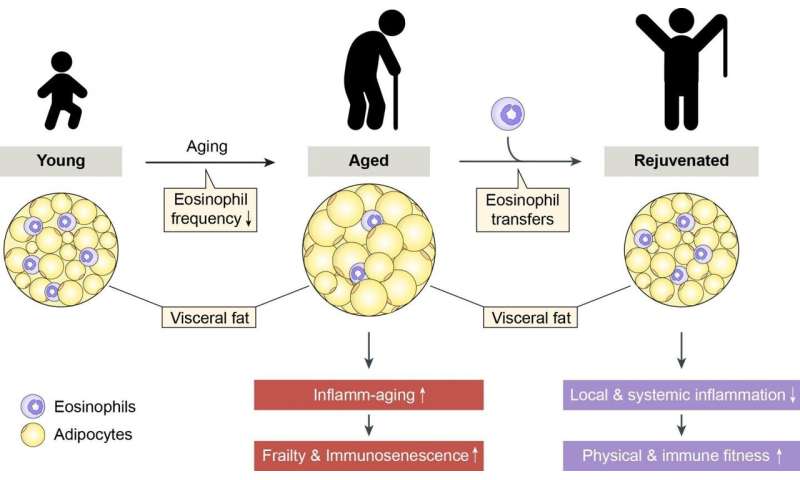.
S O U R C E : MedicalXpress
P A Y W A L L E D P R I M A L S O U R C E : nature metabolism (Eosinophils regulate adipose tissue inflammation and sustain physical and immunological fitness in old age).

With age the frequency of adipose tissue eosinophils decreases gradually. This leads to the production of inflammatory mediators, which promote age-related impairments (e.g. frailty and immunosenescence). Eosinophil cell transfers increase the frequency of these cells in adipose tissue and dampen age-related chronic low-grade inflammation. This results in systemic rejuvenation of the aged organism. Credit: DBMR, University of Bern, D. Brigger
Elderly people are more prone to infectious diseases as the function of their immune system continuously declines with progression of age. This becomes especially apparent during seasonal influenza outbreaks or the occurrence of other viral diseases such as COVID-19. As the efficacy of vaccination in the elderly is strongly reduced, this age group is particularly vulnerable to such infectious pathogens and often shows the highest mortality rate. In addition to the age-related immune decline aged individuals are commonly affected by frailty that negatively impacts quality-of-life. Even though the average life-expectancy for humans continuous to rise, living longer is often associated with age-related health issues.
Important role of belly fat in aging processes identified
Researchers from the Department for BioMedical Reserarch (DBMR) and the Institute of Pathology at the University of Bern as well as the University Hospital Bern (Inselspital) have set out to identify new approaches to improve health-span in a fast-growing aging population. For many years scientists speculated that chronic low-grade inflammation accelerates aging processes and the development of age-related disorders. An international team of researchers under Bernese guidance has now demonstrated that visceral adipose tissue, known as belly fat, crucially contributes to the development of chronic low-grade inflammation. Scientist around Dr. Mario Noti, formerly at the Institute of Pathology of the University of Bern and Dr. Alexander Eggel from the Department for BioMedical Research (DBMR) of the Universität of Bern reported that certain immune cells in the belly fat play and an essential role in regulating chronic low-grade inflammation and downstream aging processes. They could show, that these immune cells may be used to reverse such processes. The findings of this study have been published in the scientific journal Nature Metabolism and were further highlighted by a News and Views editorial article.

Detection of Eosinophils in human visceral adipose tissue using two different staining methods. Eosinophils are indicated with an arrowhead. AD: adipocytes, V: blood vessel. Credit: © DBMR, Universiy of Bern, D. Brigger
Belly fat as a source of chronic inflammation
The team around Dr. Noti and Dr. Eggel could demonstrated that a certain kind of immune cells, known as eosinophils, which are predominantly found in the blood circulation, are also present in belly fat of both humans and mice. Although classically known to provide protection from parasite infection and to promote allergic airway disease, eosinophils located in belly fat are responsible to maintain local immune homeostasis. With increasing age the frequency of eosinophils in belly fat declines, while the number of pro-inflammatory macrophages increases. Owing to this immune cell dysbalance, belly fat turns into a source of pro-inflammatory mediators accumulating systemically in old age.















































